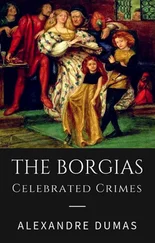The duke, however, declined to give way without a struggle; he demanded an increase in the dowry with another 20,000 ducats worth of precious stones; he demanded that the 4,500 ducats he was obliged to pay each year to the Vatican be rescinded. He also demanded, without much hope of being granted them, the territories of Cento, Pieve, and Cesenatico, as well as various benefices for his younger son, Ippolito, who had been made a cardinal by Alexander VI in 1493. Unwilling to commit himself to the proposed marriage of his son into a family he considered upstarts, he had raised objection after objection, stipulated condition after condition, asked for guarantees that the dowry would be paid, until Alexander VI had complained that the man was behaving ‘like a shopkeeper.’
Ercole I had also heard the distasteful rumours claiming that Lucrezia had indulged in incestuous relationships with both her father and brother — indeed there were few in Italy who had not heard them — and before agreeing to the match, he sent two diplomatic officials to Rome to make enquiries about the Borgia girl and her suitability for admittance into the distinguished House of Este.
When the envoys arrived in Rome, they were admitted immediately to Lucrezia’s presence. Later that day they reported to their ‘most illustrious and excellent prince’ that ‘we entered the palace where the illustrious Lucrezia lives, and where, tired with riding and thinking we were going to rest, we were immediately conducted into the said Lucrezia’s presence, where we were graciously received. We expressed the infinite pleasure and contentment of your Excellency, and the great love which your Excellency bears her,’ emphasizing, as they had been ordered to do, ‘how perfectly disposed your Excellency is to treat her well.’ The two envoys did their work conscientiously, taking almost four months over it and finally deciding that Lucrezia was an acceptable bride.
There were several problems concerning Lucrezia’s past that needed careful consideration. Her son Rodrigo was one such issue. He was living with his mother in Rome; but it was decided that it would not do for him to accompany her to Ferrara. The Ferrarese ambassador in Rome went to see Lucrezia about this to ask her ‘what was to be done with him; she replied, “He will remain in Rome and will have an allowance of 15,000 ducats.”’ The fact that Lucrezia had already borne a son was, of course, an advantage to a duke in need of grandsons to secure his family line.
There was also the issue of Lucrezia’s divorced husband, Giovanni Sforza, who was living in Ferrara, to be settled. The pope wrote about this to the two envoys who had been sent by Ercole I to make enquiries concerning Lucrezia. They, in turn, passed his request on to the duke; the pope ‘has asked us to write to Your Excellency to request that you see to it that the Lord Giovanni of Pesaro shall not be in Ferrara at the time of the marriage celebrations, for, although his divorce from the illustrious lady was absolutely legal,’ they insisted, ‘himself fully consenting to it, he may, nevertheless still feel some resentment.’
Meanwhile, negotiations about the dowry had reached their conclusion, and it was clear that Ercole I had extracted a high price. It was agreed that Lucrezia should bring 100,000 ducats and that she should also take to Ferrara jewellery, carpets, linen, tapestries, furniture, silver, and objets d’art and de vertu worth a further 75,000 ducats. The duke would receive the castles and lands of Cento and Pieve — though not the port of Cesenatico, which properly belonged to the duchy of Romagna — as well as a reduction in the annual census payable to the Vatican from 4,500 ducats to a token sum of 100 ducats. Cardinal Ippolito d’Este was to be made bishop of Ferrara and receive other benefices worth 14,000 ducats a year and a palace by St Peter’s. Ercole I was jubilant; the deal, he thought, was worth a total of 400,000 ducats to his family. ‘If I could overcome my distaste for these Borgia upstarts,’ Alfonso informed his father, ‘I might even consider myself fortunate.’
At last, on August 26, 1501, the marriage contract was signed, and Lucrezia, just twenty-one years old, was to be a bride for the third time. For her own part, having been sent a portrait of her future husband and heard reports of his taste for low life and low company, she decided that, once she had given him children, Alfonso would let her go her own way. Moreover, the proposed marriage into the Este family would allow her to escape from Rome, a place associated with unhappy episodes in her young life.
And the old duke was soon to be grateful to his prospective daughter-in-law for more than mere money. In 1499 Ercole I had heard of a nun at the Dominican convent at Viterbo, Sister Lucia da Narni, who had been developing stigmata on her hands every Friday. A man much intrigued by such miracles, the duke decided to bring the nun to Ferrara. The mother superior, however, was reluctant to part with so potentially valuable an asset, though Sister Lucia herself was quite willing to go. So the duke arranged for her to be spirited out of the convent in a basket and taken to Ferrara, where, unfortunately, she felt dreadfully homesick, missing the nuns whom she had left behind in Viterbo. Very well then, the duke decided, the other nuns should also come to Ferrara, where a new convent would be built for them.
Duke Ercole then sent a trusted courtier, Bartolomeo Bresciano, as his envoy to Viterbo to put this proposal to the prioress of the convent, but she objected in the strongest terms to the duke’s suggestion. Bresciano, appalled by her bossiness, called her a woman ‘more obstinate than the Devil himself ’ and turned to Lucrezia to ask her to use her influence at the papal court. Lucrezia, whom he described as ‘a delightful lady with a first-class mind,’ went out of her way to assist, negotiating in person with the pope and the Dominicans until, at last, the prioress was forced to let nine of her nuns go to Ferrara. Lucrezia ‘is endowed with such graciousness and goodness,’ wrote Bresciano to Duke Ercole, ‘and thinks only of how to serve you.’
Now that the contract had been signed, the formal betrothal between Alfonso and Lucrezia could take place. Accordingly, as Burchard recorded, ‘about the hour of Vespers on Saturday 4 September news came of the marriage contracted and concluded between Alfonso d’Este, elder son of the Duke of Ferrara, and Lucrezia Borgia, formerly the Duchess of Bisceglie and earlier the wife of Giovanni Sforza.’
The news of the forthcoming marriage was greeted in Rome with exceptional excitement and with the celebrations that the citizens so much enjoyed on these occasions; a ‘continual cannonade’ of artillery fired noisily from the ramparts of Castel Sant’Angelo while fireworks flashed and spluttered in the sky. The following day, Sunday, saw Lucrezia, dressed in a robe of gold brocade and accompanied by her ladies and several bishops, riding in the place of honour in a grand procession of three hundred horses from her palace to the Church of Santa Maria del Popolo, while her Spanish dwarfs skipped and jumped through the streets.
That evening, as the great Capitoline bell tolled, bonfires were lit at Castel Sant’Angelo and throughout the city, illuminating the towers of the castle, the Capitol, and other buildings: ‘The people became wildly excited,’ which, according to Burchard, ‘caused some anxiety.’ On Monday two clowns ‘paraded through all the principal streets and piazzas,’ continued Burchard. They went on their way, one on horseback, one on foot, both shouting loudly, ‘Long live the Duchess of Ferrara! Long live Pope Alexander! Viva! Viva!’ Lucrezia had given each of them a dress from her wardrobe; the riding clown had received the new gold brocade robe she had worn the evening before, which was said to be worth as much as 300 ducats.
Читать дальше











